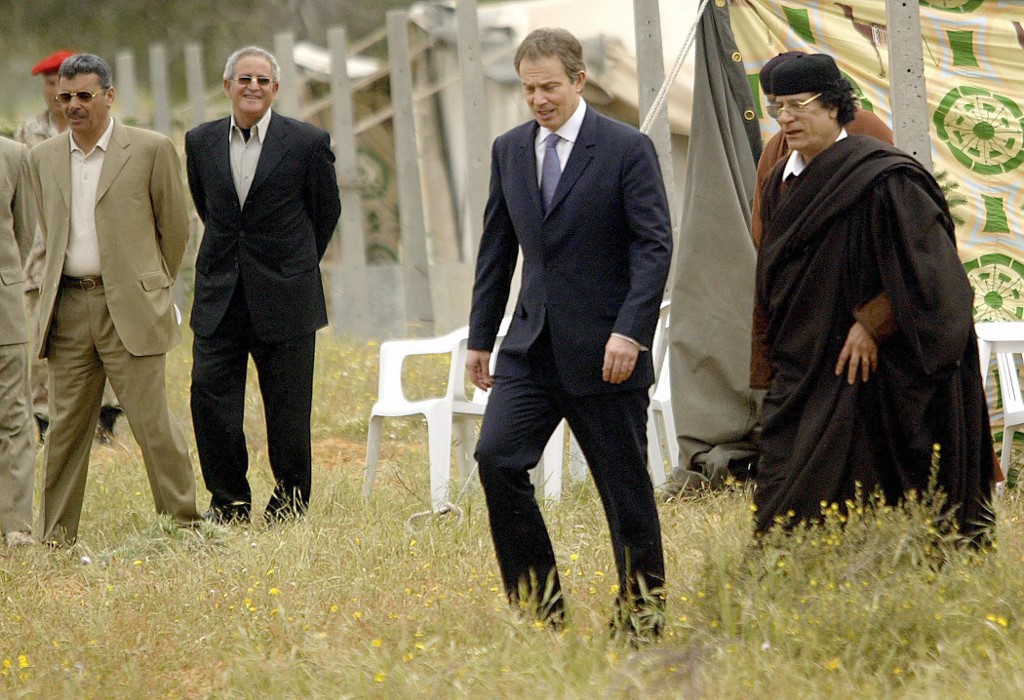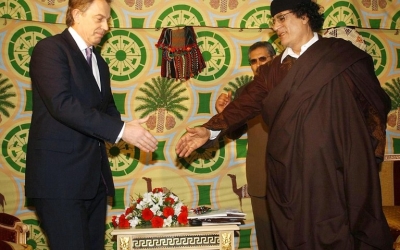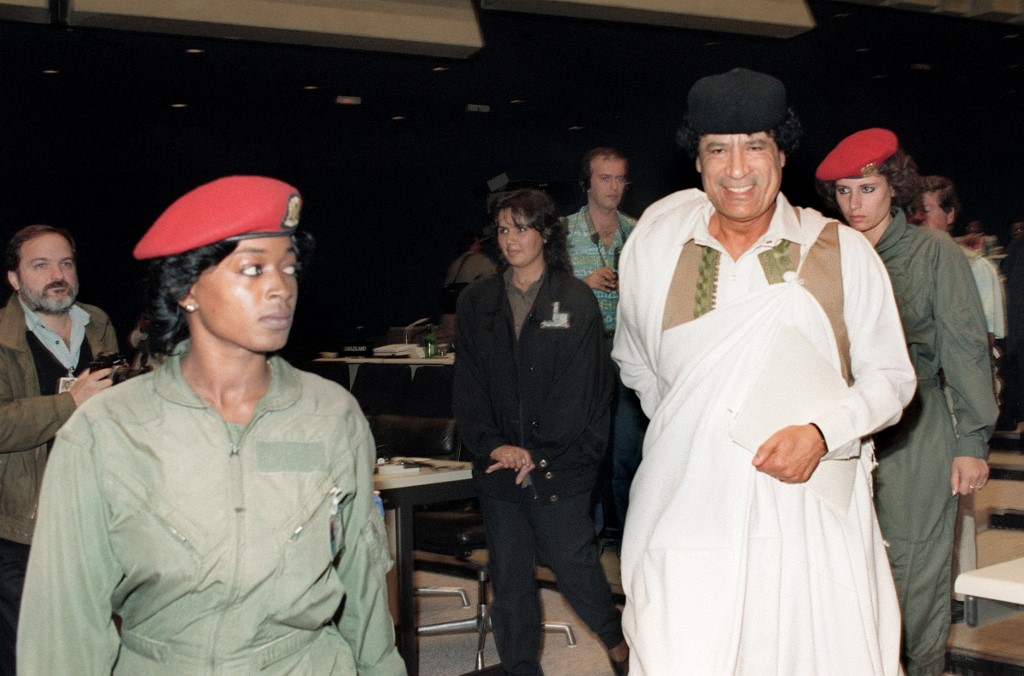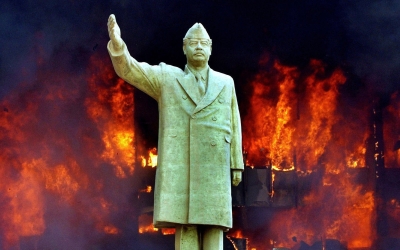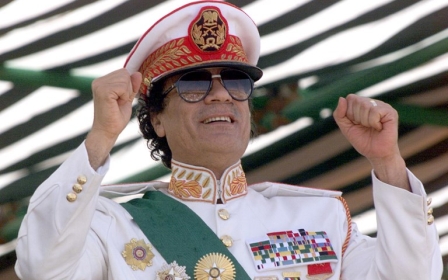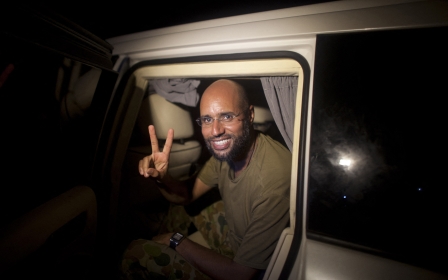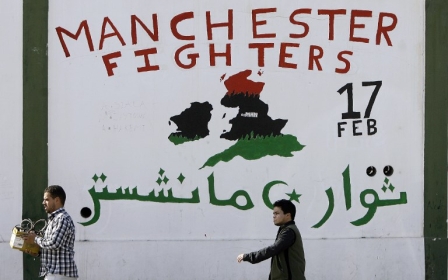Talking to Israel and berating 'vulture' Blair: Gaddafi confidante on life with Libyan leader
Israel sought to recruit Muammar Gaddafi as a middleman to negotiate a peace settlement with the Palestinians following the 2007 war in Gaza, according to a former confidante of the Libyan leader.
Israeli President Shimon Peres wanted Gaddafi, for years treated as a pariah by western countries, to replace Egyptian President Hosni Mubarak as intermediary - and held out the prospect of peace talks being hosted by Libya.
Peres believed Gaddafi was perfect for such a role because of his immense popularity in the Arab world, because there was no border between the two countries, and because the animosity between Libya and Israel was ideological and not about land.
'The Colonel did not want to take the risky step of sitting round a table with Israel... only to end up being associated with failure'
- Daad Sharab, adviser to Muammar Gaddafi
The revelation comes in a book by Gaddafi’s trusted long-time adviser, Jordanian businesswoman Daad Sharab.
Sharab tells how she was flown secretly in an Israeli private jet from Amman to Tel Aviv, where she met Peres in a hotel room.
New MEE newsletter: Jerusalem Dispatch
Sign up to get the latest insights and analysis on Israel-Palestine, alongside Turkey Unpacked and other MEE newsletters
She refused to shake hands with the Israeli premier, telling Peres: “You are killing Palestinians every day in Gaza.”
An unfazed Peres told her that Israel wanted to “solve the Gaza issue by signing some sort of agreement with the Palestinians,” adding that “Gaddafi would be an ideal middle man”.
According to Sharab, Peres told her that “we are willing to fly to Libya or to meet him [Gaddafi] in a neutral country”.
After discussions they agreed that Jordan would be the ideal meeting place - and Sharab shook hands with Peres at the end of the meeting. Gaddafi, nervous of domestic criticism if the Libyan people learnt he was talking to Israel, agreed on condition that the talks would be held in secret.
But Sharab says: “The colonel [Gaddafi] did not want to take the risky step of sitting round a table with Israel, which would be bound to upset many Libyans, only to end up being associated with failure."
As a guarantee, Gaddafi demanded that if the talks failed and were later leaked then King Abdullah of Jordan would break his country’s peace treaty with Israel. This demand proved unacceptable and the initiative came to nothing.
Sharab, who spent more than 20 years working for Gaddafi as a travelling trouble-shooter and fixer, notes, however, that “the Israeli approach was more fuel for the colonel’s ego.”
Hillary Clinton and Tony Blair
In a wide-ranging interview with Middle East Eye following publication of her memoir, The Colonel and I: My Life with Gaddafi, Sharab talked about how the Libyan leader sent her on secret missions around the globe, during which she dealt directly with US President George HW Bush and visited alleged Lockerbie bomber Abdel Basset al-Megrahi in jail.
She describes how Gaddafi, who ruled Libya from 1969 until his assassination in 2011, finally betrayed her, holding her under house arrest for more than two years. She says she was lucky to survive as Nato bombs rained down on Tripoli during the western-backed uprising that ended Gaddafi’s rule and his life.
Talking to MEE at her London home, Sharab excoriates former US Secretary of State Hillary Clinton, who she says spoke highly of Gaddafi when the pair met privately over an intimate dinner in New York - only to publicly gloat later when the dictator was killed.
Clinton “was very interested in meeting Gaddafi. She said he was very charismatic and that she would like to meet him and bring Bill with her,” Sharab told MEE.
But Sharab writes in her book she was dismayed when she heard Clinton had joked, “We came, we saw, he died,” after the Libyan leader’s killing a few days after Clinton had been in Tripoli for talks with transitional leaders.
“It was not the behaviour of a stateswoman, with aspirations for high office… It was the sort of stupid bravado you’d expect from Trump. I thought she was better than that and recalled our dinner in New York when she seemed keen to work with the regime in Libya,” said Sharab.
She dismisses another western leader who embraced Gaddafi, British Prime Minister Tony Blair, as “a vulture hovering over Libya”.
When asked by MEE to explain, she said that Blair “made a deal with Libya to make money for his country, and not to be fair” - an apparent reference to the so-called “deal in the desert”, agreed with a handshake between the leaders in a tent outside Tripoli in 2004.
The deal cemented security and intelligence ties between the countries, including the British-orchestrated rendition of Libyan dissidents by the CIA to Tripoli - and also secured trade and oil deals for British firms.
Sharab says she “never fully trusted” Blair’s motives, even though she says he had a warm relationship with Gaddafi.
She recalls hearing Gaddafi complain to Blair about humiliating images of the former Iraqi leader Saddam Hussein being displayed on television after he was captured following the 2003 US-led invasion, stating that: “Saddam is a military man and the head of the army. He should be treated with respect."
Gaddafi warned Blair that “treating an Arab leader in this way only builds anger against Britain and America”.
Blair replied that “the prime minister of Britain does not control the media,” an answer that Sharab reports “did not seem to satisfy” the Libyan leader, who insisted the same thing should not happen again.
Lockerbie deal
Blair’s relationship with Gaddafi had been made possible by Libya’s admission of responsibility in 1999 for the bombing of Pan Am flight 103 from London to New York in 1988, which exploded over the Scottish town of Lockerbie, killing all 259 passengers and crew, along with 11 people on the ground.
With Libya identified as a possible culprit in the weeks after the bombing, Gaddafi sent Sharab as his envoy to then-US President George HW Bush, who told her to deal not with the United States but with the British.
Eventually a deal was struck, with Libya accepting responsibility and paying $10m to each of the families of the dead in return for the removal of sanctions.
Megrahi, an alleged former Libyan intelligence officer who had been made a suspect in the case since 1991, was handed over to stand trial at a special Scottish court convened in the Netherlands and jailed for life in 2001.
Sharab insists that the deal was “all about money, not justice,” adding that the West needed a “victim to blame”, while Gaddafi wanted “a way out of the mess of sanctions”.
She told MEE that Gaddafi told her “they framed Libya and he had done nothing. He said if he had done it, he would admit it, but he didn’t do it.”
Speculation over who was responsible for the Lockerbie bombing has continued in the decades since Libya admitted responsibility.
In 2014, an Al Jazeera investigation alleged that an Iranian-funded Syria-based Palestinian organisation, the Popular Front for the Liberation of Palestine-General Command (PFLP-GC), had carried out the attack to avenge the shooting down of an Iranian airliner by a US warship in the Gulf in 1988.
Sharab is deeply sympathetic to Megrahi, who she visited in prison in Scotland prior to his release on compassionate grounds in 2009 after a terminal cancer diagnosis. He died at home in Tripoli in 2012.
Today she says that the West framed an “innocent man” who resembled a “mild-mannered accountant”.
She attacks Gaddafi’s son Saif for publicly taking credit for Megrahi’s return to Libya. She says he was barely involved in his release and “never once bothered” to visit Megrahi in jail.
MEE put to Sharab the claim, made by Libya’s former justice minister Mustafa Abdel-Jalil in 2011, that Gaddafi personally ordered the bombing.
She replied: “He knows nothing. He was minister when Gaddafi was president. Why would you work with the guy if you were sure he did that?”
“In my eyes,” states Sharab, “Al-Megrahi was the 271st Lockerbie victim.”
She accuses British intelligence of knowing the truth about Megrahi - but covering it up. Asked by MEE for evidence to support this assertion, she said it was “based on what Gaddafi told me and what Megrahi told me in prison. Both said he was innocent. And if Megrahi was guilty Britain would not have released him.”
‘You are not welcome here’
In her book, Sharab describes run-ins with Gaddafi’s notorious intelligence bosses, who she accuses of conspiring to destroy her because they were jealous of the access and influence she enjoyed.
Her first major mission for Gaddafi, she says, was to visit Libyans held in British jails after being sent abroad to kill foreign-based dissidents.
Posing as a representative of the “Libyan Womens’ Union”, she secured access to the prisoners, only to discover that millions of dollars set aside for their legal costs had been stolen by Libyan intelligence.
When she informed Gaddafi, she made an enemy of the intelligence services. Thereafter she says she was followed, secretly filmed and her phone was tapped.
Her most powerful enemy was Abdullah Senussi, the head of internal security, whom she describes as “an evil character, capable of anything”.
According to her account, Senussi, who was also Gaddafi's brother-in-law, told her: “You are not welcome here.”
Sharab records in her autobiography that she replied: “If that really is the case I need to hear it from Gaddafi, not you.”
From that moment she realised that she was reliant on Gaddafi alone for her safety in Libya. Though she was close to the leader and enjoyed his trust, Sharab denies she was his lover and says he never made a pass at her.
'If I really was Gaddafi’s mistress I would not have lasted in Libya for 22 years'
- Daad Sharab
“If I really was Gaddafi’s mistress I would not have lasted in Libya for 22 years,” she said.
Sharab believes that Gaddafi’s deal with the West marked the beginning of his downfall. She wonders whether the Lockerbie deal, the ending of sanctions and acceptance of Gaddafi on the international stage “actually sealed his fate”.
“He became a different person,” she said. Gaddafi felt that “he's not touchable anymore. He thinks he's above all the law in the world.”
According to Sharab, Gaddafi stopped listening to advice and was no longer paying attention to serious matters within Libya. Nor was he contemplating his own succession, despite having been in power since 1969.
She asked him: “When you die, who is going to handle Libya?” Gaddafi replied: “I don’t care. Me first, then to Hell afterwards. I don’t care what happens.”
‘Neither angel nor devil’
But she defends Gaddafi’s record as a leader. She says he promoted girls’ education and encouraged women to attend university and take professional jobs. People benefited from free healthcare and state-supported housing, she says.
MEE asked her whether she was aware of the brutality of the regime she was working for, citing the notorious Abu Salim prison, the torture that took place there and the 1996 massacre in which hundreds of prisoners are estimated to have been killed.
“This was done by the intelligence chief, Senussi, not Gaddafi,” she said. “When I worked with Gaddafi I didn’t see anything bad. I am not saying that Gaddafi was an angel or a devil. I am just saying what happened to me.”
But why, if Gaddafi was popular, did so many people rise up against him in 2011, and why did so many celebrate his brutal killing?
Video of Gaddafi’s death showed him being beaten and then shot by fighters after being injured in a Nato attack on a convoy in which he was travelling on the outskirts of Sirte, his home city and final stronghold.
Sharab refuses to call the uprising a revolution and suggests that if Nato had not intervened Gaddafi “would still be in charge”. “People celebrated because they thought they would have a better future,” she told MEE.
In her book, she writes: “His death created a huge void. Libya today is a much more dangerous and divided country.”
Sharab reserves her disdain for the western leaders she accuses of cultivating Gaddafi and then abandoning him in his “darkest hour”.
Conversely, she describes Russian President Vladmir Putin as “among the few politicians who did not appear to relish Gaddafi’s downfall”.
Reflecting on her life with the man who ruled Libya for four decades, Sharab is philosophical: “He’s part of my history. He’s part of my life. I cannot delete it. I will never regret working with him. But it was a sad ending.”
This article is available in French on Middle East Eye French edition.
Middle East Eye delivers independent and unrivalled coverage and analysis of the Middle East, North Africa and beyond. To learn more about republishing this content and the associated fees, please fill out this form. More about MEE can be found here.


